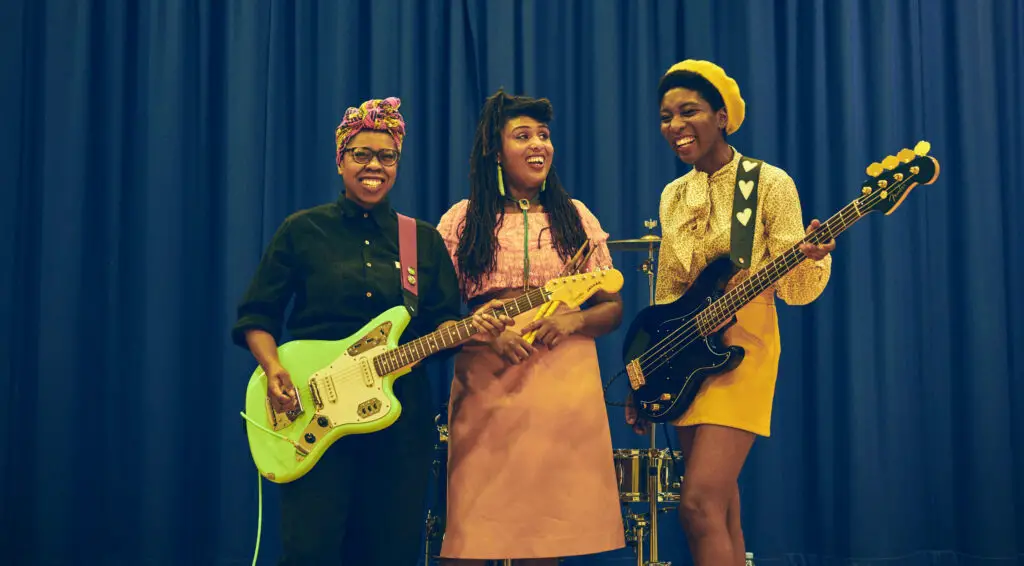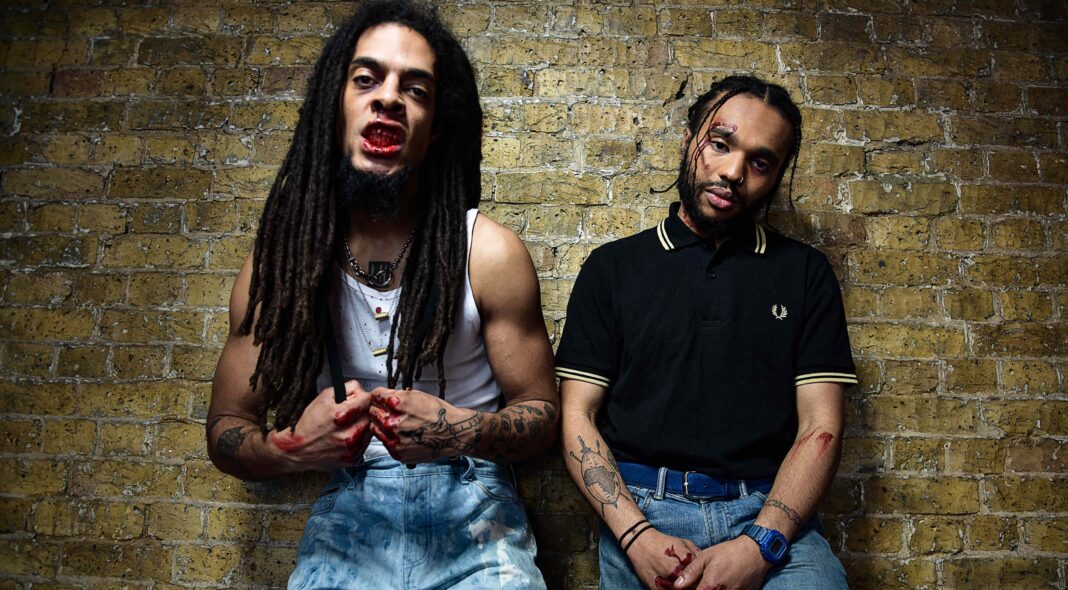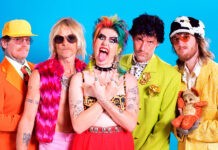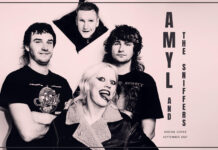“We’re Bikini Kill and we want revolution, Girl-style now!” Kathleen Hanna yelled out on Bikini Kill’s 1992 track, ‘Double Dare Ya’, 15 years after X-Ray Spex’s release of ‘Oh Bondage! Up Yours!’, in 1977. The sub-genres of riot grrrl and feminist punk are still relevant today, a rallying cry for marginalised communities across the world. The “girls to the front” mantra empowered women to take up space at live shows, and in the industry itself, both of which had always been hostile environments. Punk had always been a movement dominated by men, discouraging women from taking part for fear that they may not be good or strong enough. Women had grown tired of a culture of standing backstage, at the sidelines, watching men have all the fun. But, is it still “girls to the front” now?
After a lot of backlash against their previous tours, British “for the last time, we’re not a fucking punk band” punk band IDLES recently announced that all of their special guests on their next tour will be women and non-binary people. It was a welcome change, after criticisms voiced by many within the industry, including Nadine Shah, who responded to an NME interview with IDLES in which they argued that they “couldn’t afford” Shah, to which she replied, on Twitter, “Howay @idlesband You offered me a few hundred quid”. It’s a sad fact of the industry that it is men who hold the power and opportunity to platform women, and not the other way round. Demanding that men step up is an age-old conversation, and it is, quite frankly, tiring.
It’s a mystery why, then, given how well-received IDLES’ political takes are by their fans and the industry, they are yet to call out festival line-ups (that they appear on), that do not platform women, such as what would have been this year’s Reading and Leeds festival.
The lack of platforming is a huge issue in punk music, and one that Decolonise Fest have tried to correct. Decolonise Fest alumni, Screaming Toenail, told me “there is lots of diversity in punk music, but there is not a lot of diversity in who gets platformed. A lot of Black musicians are heavily inspired by punk, but recognise that the music industry has a habit of pigeonholing Black artists into “urban” genres regardless of whether its a suitable label. Whatever the fuck urban means anyway. I mean, Lil Uzi Vert’s biggest influences are Hayley Williams and Marilyn Manson! So, punks of colour often fall off the escalator halfway up, or change direction in order to progress their careers.”
It’s clear that the issue is not that there aren’t any women or BIPOC in the scene; it’s that opportunities to be platformed, and interest in music that hasn’t been made by white men, are scarce. The industry sees the leftist music of white male bands more marketable and palatable than the words of marginalised people; after all, it has taken punk/grime duo Bob Vylan years to be supported by any industry platforms, for fear that their music would be classed as “too extreme”.
Both IDLES and Fontaines D.C. took days to address the renewed interest in Black Lives Matter this summer. Sleaford Mods, Amyl and the Sniffers, Goat Girl, Hotel Lux and Shame, on the other hand, worked at lightning speed to call out racism. Of course, no one is under any obligation to post on social media, and some bands just aren’t as active online. However, we shouldn’t underestimate the importance of a platform, and how important it is for punk bands to actually publicly support leftist movements. IDLES guitarist Mark Bowen recently rationalised their slow reaction, stating “in anything that we do, we want to be considered and for it to be IDLES. And that means we’re not reactionary”, arguing that they had received advice from a friend who “works for Black Lives Matter”.
The political left finds itself in a difficult position, one it’s never really grown out of. How revolutionary and intersectional can a movement be when some of its loudest voices are middle class intellectuals? This issue is mirrored in punk. As Bob Vylan recently put it, “when people suffering speak about it, no-one wants to listen”, and then, later, “but let someone like IDLES say something, and people go ‘oh bravo’”.
Surely, if you’re selling records because of your catchy political lyrics and left-wing persona, and you have a platform, then you should use it. All of these bands have predominantly white fan bases. Some of whom aren’t necessarily in agreement with leftist ideas and are “just here for the music”. That’s a demographic they can easily reach with just a tweet. Moral of the story? Don’t fall asleep at the wheel when a revolution calls.
Our ideas about the history of punk, and which bands have stayed the course, also contribute to a lack of diversity. Fellow music journalist, Laviea Thomas, tells me that “like most music genres, punk has evolved and shape-shifted over time. Unfortunately during the process, it has lost its spunk. Punk started out as this empowering sub-culture that welcomed all, and emphasised a massive fuck-you to the system. Today’s punk is sexist, forgettable and currently suffocated by a bunch of white dudes who think the Sex Pistols paved the way for the birth of punk.”
Laviea makes an interesting point on history here. How many punk die-hards have albums by Pure Hell, or Death in amongst their Clash and Pistols records? After chatting to Estella Adeyeri (of Big Joanie and Decolonise Fest), it seemed pretty clear that our understanding of punk isn’t entirely truthful. “So much of the history of punk has just been whitewashed, inevitably. I guess it would be in the wider social structure where a lot of history is whitewashed anyway”, she said. On Decolonise Fest, she reflected “We realised that there’s a two-fold issue where people of colour weren’t really necessarily being recognised today, but also their contributions have been very easily forgotten. It’s very easy to think that punk was totally white if that’s the story you’re getting told day in and day out, and look at how long it took to get that documentary made about Death”

With those so wildly held up as pioneers of punk and post-punk, it feels as if the spirit of the movement has been lost. Former Sex Pistols lead singer John Lydon’s described President Donald Trump as “not racist”, and Nigel Farage as “fantastic” in 2017 and recently, a photo of him wearing a MAGA T-shirt has circulated online.
And he’s not the only previously adored frontman to fall from grace in recent years: see; Morrissey, and, more recently, Ian Brown. The rise of populism has led to the idea that leftism is now somehow the dominant idea and an obstacle to free speech. It’s unsurprising, then, that the men who were our gentle gateway into punk would now be the ones subverting it, in what they probably deem as true revolutionary-style. It’s the kind of behaviour that makes you want to put on Dead Kennedys and kick some bins over.
But perhaps it’s short-sighted to assume counter-cultural music should be a force for good when history has proven otherwise. The far-right and conservatism are, sadly, not a new phenomenon in punk or any other counter-cultural sub-genre. Arguably the most well-known black metal project is led by famed Nazi, Varg Vikernes. In 2002, Johnny Ramone sincerely exclaimed “God bless President Bush and God bless America” at the Rock And Roll Hall Of Fame Awards. Former Pantera frontman, Phil Anselmo, ended a 2016 gig with a Nazi salute and the proud exclamation of “white power!”. Sid Vicious of the Sex Pistols frequently wore Nazi emblems for shock value.
Broadly speaking, rock music is not the anti-establishment, rebellious, free-spirited world we were sold. When asked about his opinion on Morrissey last year, The Killers frontman Brandon Flowers stated that he was “still a King”. Primal Scream used the seeped-in-racist-subtext confederate flag for their 1994 ‘Give Out But Don’t Give Up’ album cover to convey their new southern-focused sound.
Money talks. Supporting artists, such as the ones I’ve just mentioned, whilst they continue to behave in this way, shows either a lack of care for marginalised people, or ignorance about issues of politics, human rights and history. In recent years we have seen the power of revenue from fan support across other genres, particularly K-Pop. This is also true of punk bands and artists who are not only empowered and platformed by the industry, and rely heavily on fan support.
It’s up to us, as punk fans, to decide where best to spend our money. Out of a lack of platforming comes the creation of DIY spaces that truly accommodate marginalised people. “I feel like my scene within punk is very much what I need it to be, which is diverse and full of women, non-binary and trans artists, and POC artists, and I guess that is through all of these underrepresented people just doing it themselves,” Big Joanie’s Estella says. Chandni, a punk fan of colour told me that they are “always one of just a few people of colour” at gigs, and “if I wanted to find specifically a non-white punk musician or band, I would actively have to search for one, it’s not like they’d be a recommendation or that I’d see them supporting another punk artist.”
Forming spaces where marginalised people are platformed, is vital. Artists and fans demanding that venues be accessible to those with disabilities, building spaces where racism, sexism, misogyny, transphobia, queerphobia and xenophobia are met with a policy of zero tolerance, is vital. Understanding that punk, like most genres, would not be what it is today without the labour and contributions of Black people, is also vital. We are still yelling “girls to the front!” and being met with indignation. The loudest voices are not the most marginalised, despite their intentions being, on the whole, good. For punk to remain relevant, it must not only diversify, but become a credible force for change. You have to ask yourself how revolutionary it truly is, when K-Pop and Jedward are engaging in more activism than the biggest names in punk right now.







